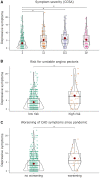The Impact of the COVID-19 Pandemic on Avoidance of Health Care, Symptom Severity, and Mental Well-Being in Patients With Coronary Artery Disease
- PMID: 34977066
- PMCID: PMC8714893
- DOI: 10.3389/fmed.2021.760265
The Impact of the COVID-19 Pandemic on Avoidance of Health Care, Symptom Severity, and Mental Well-Being in Patients With Coronary Artery Disease
Abstract
The COVID-19 pandemic affected regular health care for patients with chronic diseases. However, the impact of the pandemic on primary care for patients with coronary artery disease (CAD) who are enrolled in a structured disease management program (DMP) in Germany is not clear. We investigated whether the pandemic affected primary care and health outcomes of DMP-CAD patients (n = 750) by using a questionnaire assessing patients' utilization of medical care, CAD symptoms, as well as health behavior and mental health since March 2020. We found that out of concern about getting infected with COVID-19, 9.1% of the patients did not consult a medical practitioner despite having CAD symptoms. Perceived own influence on infection risk was lower and anxiety was higher in these patients compared to symptomatic CAD patients who consulted a physician. Among the patients who reported chest pain lasting longer than 30 min, one third did not consult a medical practitioner subsequently. These patients were generally more worried about COVID-19. Patients with at least one worsening CAD symptom (chest pain, dyspnea, perspiration, or nausea without apparent reason) since the pandemic showed more depressive symptoms, higher anxiety scores, and were less likely to consult a doctor despite having CAD symptoms out of fear of infection. Our results provide evidence that the majority of patients received sufficient medical care during the COVID-19 pandemic in Germany. However, one in ten patients could be considered particularly at risk for medical undersupply and adverse health outcomes. The perceived infection risk with COVID-19 might have facilitated the decision not to consult a medical doctor.
Keywords: Disease Management Program (DMP); SARS-CoV-2; angina pectoris; anxiety; coronary heart disease (CHD); depressive symptoms; primary care; treatment-seeking.
Copyright © 2021 Maehl, Bleckwenn, Riedel-Heller, Mehlhorn, Lippmann, Deutsch and Schrimpf.
Conflict of interest statement
The authors declare that the research was conducted in the absence of any commercial or financial relationships that could be construed as a potential conflict of interest.
Figures





References
-
- Günster C, Drogan D, Hentschker C, Klauber J, Malzahn J, Schillinger G, et al. WIdO-Report : Entwicklung der Krankenhausfallzahlen während des Coronavirus-Lockdowns. Berlin: Nach ICD-Diagnosekapiteln und ausgewählten Behandlungsanlässen. (2020).
LinkOut - more resources
Full Text Sources
Miscellaneous

